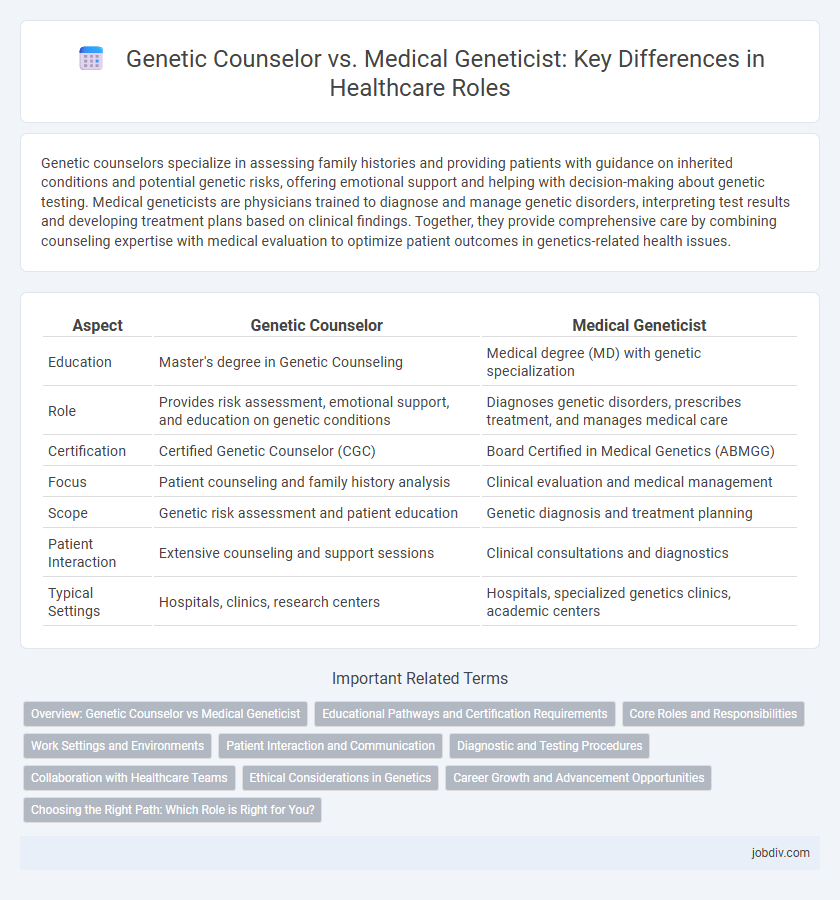Genetic counselors specialize in assessing family histories and providing patients with guidance on inherited conditions and potential genetic risks, offering emotional support and helping with decision-making about genetic testing. Medical geneticists are physicians trained to diagnose and manage genetic disorders, interpreting test results and developing treatment plans based on clinical findings. Together, they provide comprehensive care by combining counseling expertise with medical evaluation to optimize patient outcomes in genetics-related health issues.
Table of Comparison
| Aspect | Genetic Counselor | Medical Geneticist |
|---|---|---|
| Education | Master's degree in Genetic Counseling | Medical degree (MD) with genetic specialization |
| Role | Provides risk assessment, emotional support, and education on genetic conditions | Diagnoses genetic disorders, prescribes treatment, and manages medical care |
| Certification | Certified Genetic Counselor (CGC) | Board Certified in Medical Genetics (ABMGG) |
| Focus | Patient counseling and family history analysis | Clinical evaluation and medical management |
| Scope | Genetic risk assessment and patient education | Genetic diagnosis and treatment planning |
| Patient Interaction | Extensive counseling and support sessions | Clinical consultations and diagnostics |
| Typical Settings | Hospitals, clinics, research centers | Hospitals, specialized genetics clinics, academic centers |
Overview: Genetic Counselor vs Medical Geneticist
Genetic counselors specialize in assessing family history, educating patients about genetic risks, and providing emotional support for inherited conditions. Medical geneticists are physicians trained to diagnose and manage complex genetic disorders through clinical evaluation and interpretation of genetic testing. Both professionals collaborate to develop personalized treatment plans and facilitate informed decision-making in genetic healthcare.
Educational Pathways and Certification Requirements
Genetic counselors typically complete a master's degree in genetic counseling accredited by the Accreditation Council for Genetic Counseling (ACGC) and must pass the American Board of Genetic Counseling (ABGC) certification exam to practice. Medical geneticists are physicians who earn a medical degree (MD or DO), complete a residency in internal medicine, pediatrics, or pathology, followed by a fellowship in medical genetics, and obtain board certification through the American Board of Medical Genetics and Genomics (ABMGG). Both professions require ongoing continuing education to maintain certification and stay current with advancements in genetic testing and personalized medicine.
Core Roles and Responsibilities
Genetic counselors specialize in assessing individual and family risk for inherited conditions, providing education, emotional support, and guidance on genetic testing options. Medical geneticists are physicians who diagnose and manage complex genetic disorders, interpret test results, and develop personalized treatment plans. Both professionals collaborate to optimize patient care by integrating genetic information in clinical decision-making.
Work Settings and Environments
Genetic counselors primarily work in clinical settings such as hospitals, fertility clinics, and specialized genetic testing laboratories, providing patient-centered risk assessment and education. Medical geneticists are often found in hospital genetics departments, research institutions, and academic medical centers where they diagnose genetic disorders and lead complex medical evaluations. Both professionals collaborate across multidisciplinary teams to integrate genetic information into patient care and treatment planning.
Patient Interaction and Communication
Genetic counselors specialize in guiding patients through complex genetic information, offering empathetic communication and personalized support to facilitate informed decision-making. Medical geneticists, as physicians, focus on diagnosing and managing genetic disorders, often providing detailed explanations of clinical implications and treatment options during patient consultations. Effective patient interaction in genetics requires combining the counselor's supportive communication with the geneticist's medical expertise to optimize care and understanding.
Diagnostic and Testing Procedures
Genetic counselors specialize in assessing family history and providing risk evaluations through pedigree analysis and targeted genetic testing coordination. Medical geneticists conduct comprehensive diagnostic evaluations, including physical examinations and interpretation of complex genetic test results to diagnose inherited disorders accurately. Both professionals collaborate in selecting appropriate molecular tests such as chromosomal microarray and whole exome sequencing to guide personalized patient care.
Collaboration with Healthcare Teams
Genetic counselors collaborate closely with healthcare teams by providing risk assessments, interpreting genetic test results, and offering psychosocial support to patients and families. Medical geneticists contribute expert knowledge in diagnosing and managing genetic disorders, guiding treatment plans based on genetic findings. Together, they integrate clinical genetics expertise, enhancing personalized care and decision-making in multidisciplinary healthcare settings.
Ethical Considerations in Genetics
Genetic counselors and medical geneticists both play crucial roles in addressing ethical considerations in genetics, such as patient confidentiality, informed consent, and the psychological impact of genetic information. Genetic counselors emphasize patient education and support, ensuring individuals understand the implications of genetic testing while respecting their autonomy and decision-making rights. Medical geneticists focus on the clinical evaluation and diagnosis, navigating ethical challenges related to incidental findings, discrimination risks, and the responsible use of genetic data in patient care.
Career Growth and Advancement Opportunities
Career growth for genetic counselors involves expanding roles in personalized medicine, prenatal testing, and cancer genetics, with opportunities to specialize or move into healthcare administration and research. Medical geneticists experience advancement through clinical practice leadership, academic appointments, and involvement in cutting-edge genomic research, often influencing treatment protocols and genetic testing standards. Both careers offer increasing demand due to advancements in genomics, but medical geneticists typically require a medical degree, leading to higher clinical responsibility and potential for multidisciplinary collaboration.
Choosing the Right Path: Which Role is Right for You?
Genetic counselors specialize in interpreting family histories and genetic test results to provide patients with guidance and emotional support, making this role ideal for those interested in patient interaction and psychosocial care. Medical geneticists focus on diagnosing and managing inherited disorders through clinical evaluations and medical interventions, suited for professionals drawn to clinical medicine and research. Evaluating your passion for patient counseling versus clinical diagnosis is essential in choosing the right path in genetic healthcare.
Genetic Counselor vs Medical Geneticist Infographic

 jobdiv.com
jobdiv.com